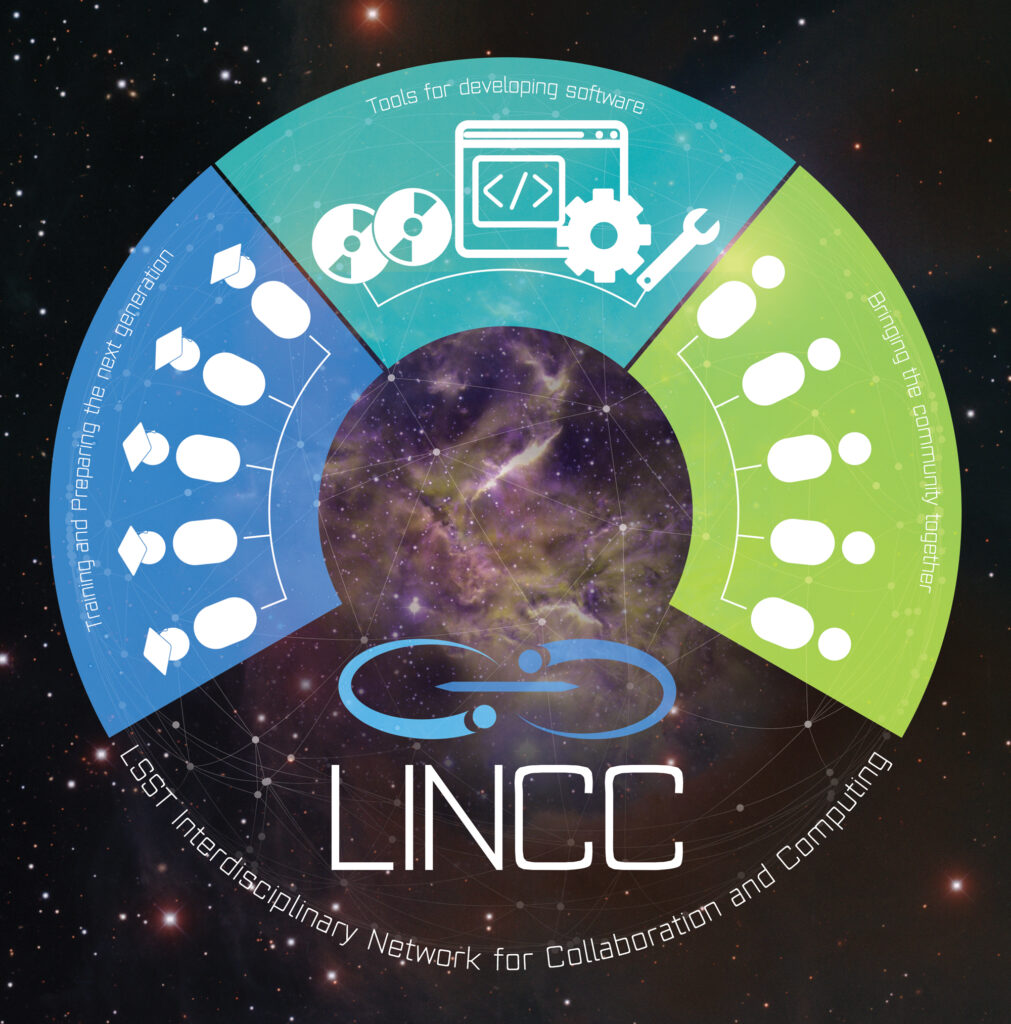What is LINCC?

The LINCC Frameworks project, supported by Schmidt Sciences, is an ambitious program to develop state-of-the-art analysis techniques capable of meeting the scale and complexity demanded by the Rubin Observatory Legacy Survey of Space and Time (Rubin LSST) data.
Launched in 2021, the program is a collaboration between the University of Washington (UW), Carnegie Mellon University (CMU), and LSST Discovery Alliance (LSST-DA).
Through interactions with the community, we will continually refine the plans, identify new opportunities to collaborate, coordinate with groups already working in these areas, and seek other areas where software infrastructure development could strongly impact community software development for LSST. Read more about the current areas of focus for the team, scientific use cases, and some of the known technical challenges. For a more comprehensive description of technical projects, including technical documents, visit the team’s wiki page.
Program Overview
Working with a team of professional software engineers and data scientists at two sites, our vision is to support the LSST community through the development of cloud-based analysis frameworks for LSST science.
We seek to enable the delivery of key computational infrastructure and code for petabyte-scale analyses, mechanisms to search for one-in-a-million events in continuous streams of data, and community organizations and communication channels that enable researchers to develop and share their algorithms and software. Our systems will work on a range of environments, from commercial cloud to HPC, supporting the wide range of computing resources used by the astronomical community.

LINCC Frameworks will engage the LSST science community in prioritizing and designing the software frameworks needed to support early science. The five-year development timeline for LINCC has a phased approach for deliverables, their application to increasingly large and more complex datasets, and engagement with an increasingly broader community.
For more information, contact Andy Connolly and Rachel Mandelbaum. Please select LINCC Frameworks on the contact form. You can also sign up for our mailing list to receive notices related to LINCC Frameworks, such as announcements of Tech Talks.
Areas of Focus
Through interactions with the community, we will continually refine the plans, identify new opportunities to collaborate, coordinate with groups already working in these areas, and seek other areas where software infrastructure development could strongly impact community software development for LSST. Read more about the current areas of focus for the team, scientific use cases, and some of the known technical challenges. For a more comprehensive description of technical projects, including technical documents, visit the team’s wiki page.
Community Engagement and Collaboration
To encourage the science community to help shape the design and functionality of the analysis system, we will deliver:
Software Frameworks and General Purpose Tools
Frameworks will run on both commercial cloud and HPC that support scaling cross-cutting scientific analysis to Rubin scale data. We’ll also make contributions to general-purpose tools, including existing open-source projects and cross-project infrastructure.
Incubators
With $20K research grants, the LINCC Frameworks Incubator Program brings research teams together with the LINCC software team to develop their own science analyses using the LINCC tools and framework (Check out our call for proposals and our incubator awardees).
Workshops and Hack Weeks
Together, we’ll define the functionality and priorities for the software frameworks and the tools LINCC will help build. We’ll also coordinate with the LSST Science Collaborations (SCs) to learn and test the tools. As an example, the first LINCC Frameworks community engagement activity was a workshop in 2022 called From Data to Software to Science with the Rubin Observatory LSST. We compiled a Rubin LSST YouTube playlist that provides an introduction to Rubin Observatory and what the LSST data products will look like. We are also happy to share the resulting community white paper on cross-cutting analysis software needs that will support a wide range of early LSST science cases.
Tech Talks
Delivered monthly, Tech Talks is a virtual forum to connect the Rubin LSST software community, showcasing work by the broad Rubin software and archives community designed to enable LSST science.
LINCC Frameworks Team
The LINCC Frameworks team is composed of research scientists, software engineers, and associated faculty across multiple institutions as well as leadership from LSST-DA. The research and engineering team spans two primary locations, Seattle (University of Washington) and Pittsburgh (Carnegie Mellon University and the University of Pittsburgh), with roughly half the team in each location. Each location hosts two or more research scientists and four to five engineers with local tech leads and a central engineering director. The team is dedicated to providing an inclusive environment for all people and abides by a code of conduct.
Core Team at UW:
- Faculty: Andy Connolly
- Software Engineers: Wilson Beebe, Doug Branton, Colin Orion Chandler, Sean McGuire, Drew Oldag, Max West, Neven Caplar, Sam Wyatt, Michael Tauraso
LINCC Frameworks is supported by Schmidt Sciences.